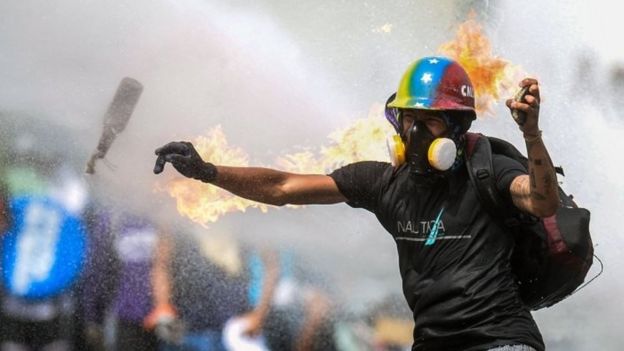Venezuela’s president has replaced four top military commanders over the use of live bullets by security forces during months of unrest.
On Monday images emerged showing security force officers apparently firing on protesters.
President Nicolas Maduro also announced the recruitment of 40,000 new police officers and national guardsmen.
Meanwhile Venezuela faced accusations of human rights abuses, at a meeting of the Organization of American States.
The military reshuffle includes the removal of Gen Antonio Benavides Torres, the head of the National Guard, who protesters accuse of being behind many of the attacks against them.
Mr Maduro also said he was replacing the heads of the army, navy and the central strategic command.

There was public outrage after photos emerged appearing to show members of the National Guard firing directly at protesters in Caracas on Monday. Another demonstrator was shot dead.
The military has maintained that the growing death toll was due to rogue soldiers.
But in May Venezuela’s attorney general, Luisa Ortega said she had witness statements that a protester had been hit by a tear gas canister fired at close range.
She said the security forces had broken international rights law.
Defence Minister Vladimir Padrino Lopez also warned the security forces this month not to commit “atrocities” after police were filmed attacking and robbing demonstrators.
At a meeting of the 34-nation Organization of American States (OAS) in Mexico, 12 countries called on President Maduro to respect human rights and announce an election timetable.
In response, Venezuelan Foreign Minister Delcy Rodriguez accused the Secretary General of the OAS, Luis Almagro, of trying to plunge her country into civil war.
She described Venezuela’s critics as “lapdogs of imperialism”.
Despite huge oil reserves, Venezuela is facing a shortage of basic items, including food and medicines as well rampant crime.
The opposition says the socialist governments of Mr Maduro and his predecessor, the late Hugo Chavez, have wrecked the economy and increasingly suppressed dissent.
It is calling for early elections and the release of jailed opposition politicians.
–
Source: BBC

